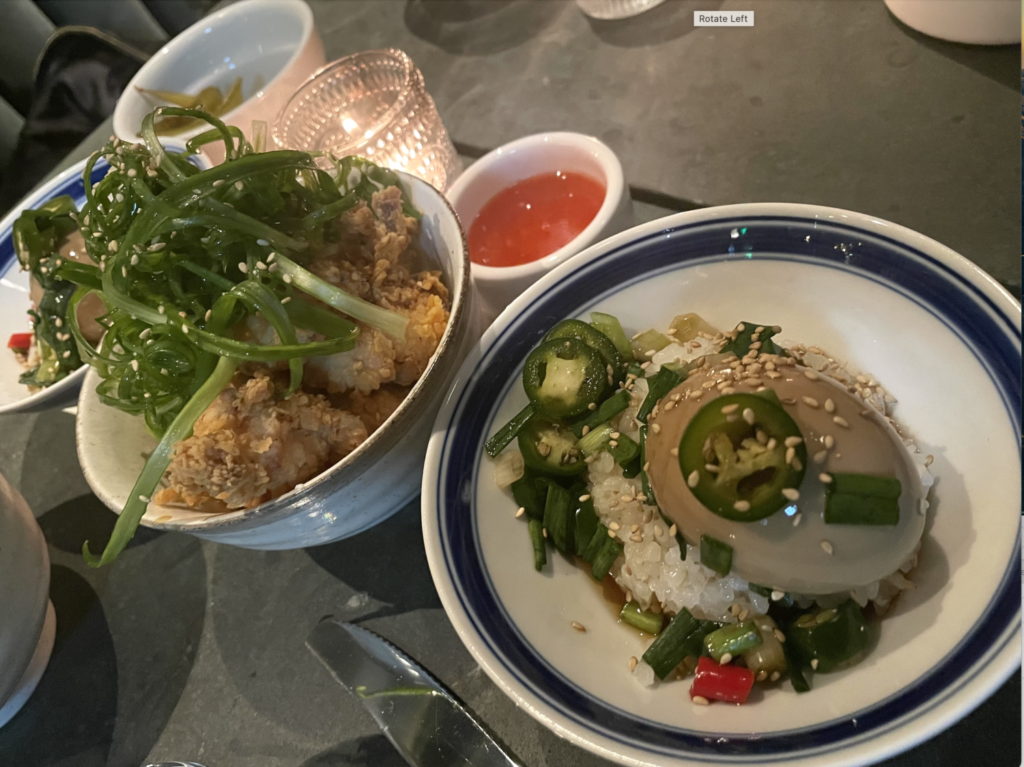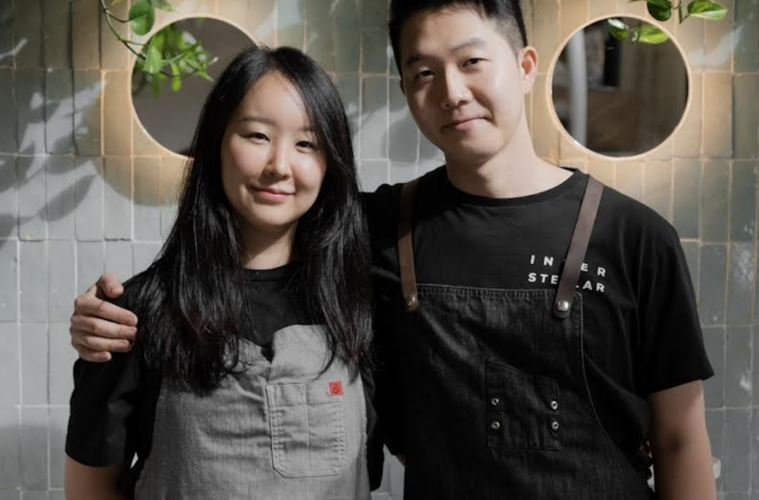Against all odds, what originally started out as a tiny artisanal coffee shop, Angie and Daniel Kim’s Interstellar in Santa Monica has evolved into an all-day cafe with three diverse menus reflecting the couple’s multicultural backgrounds. Oh yeah, and then there’s the pup menu of handmade dog food for fur babies.
The husband and wife team of Korean descent met at a class at Santa Monica College in 2011, while both were trying to navigate who they were in a city they found that finally embraced diversity.
“I came to the U.S. when I was about two years old and spent my childhood in Seattle,” Angie tells L.A. Weekly in the cafe that features moody textural green tones, gradient wallpaper and sleek green marble table tops and black oak finishes.
‘It was a little bit of a struggle back then,” says the soft spoken and diminutive culinary school graduate. “It was a time when a lot of Asian immigrants were trying to adapt and create something for themselves. I have memories of watching my parents trying to make ends meet in their teriyaki shop. It was a form of Japanese cooking and they were actually Koreans doing teppanyaki, but to many in the neighborhood, all Asian food was considered the same.”
Toshi Kasahara, a wrestler from a rural farming town in Japan, immigrated to Seattle and opened the city’s first teriyaki shop in 1976. The menu had five items, including a chicken teriyaki plate for $1.85 and chicken-beef combo for $2.10. The fast casual concept created a boom of shops in Seattle and beyond.

Ganjang Gaeran and Popcorn Chicken (Michele Stueven)
“Once we moved to Seattle, my grandmother was also living with us and always spoke Korean with me and kept the culture alive here within the family,” she says. “My parents were working all the time, so I spent a lot of time with her. She’s a very good and traditional Korean cook, and she always had a garden and a green thumb. Whether it was in her apartment or later when we moved into a larger space, she’d always grow the vegetables she cooked. It was always farm to table Korean style for us. From a very young age, I grew up in the American culture but also had that daily Korean influence.”
Chef Angie blends Korean and American ingredients together with Japanese and Italian flavors at the restaurant. There’s Ganjang Gaeren with soy sauce marinated seven-minute egg, Thai chili, serrano, garlic, rice and sesame seeds; and Tamago Natto Kake Gohan with truffle ponzu marinated egg yolk, Hokkaido natto, scallions, sesame oil and rice. There’s also Acciuga toast on a French baguette with spicy tomato anchovies, burrata and basil. The latest additions to the menu are the Loco Moco, made with rice, topped with hamburger, fried egg and gravy and the teriyaki burger with grilled pineapple and Cajun fries, homage to the time she lived in Hawaii. Most of the recipes on the menu come from her grandmother, who taught her how to make kimchi and seaweed soup among other things.
“For most Korean cooks, there’s not a specified kimchi recipe,” she says, “ it’s all son-mat (taste of the hand). No two kimchis are ever the same, even if you’re making them from the same recipe. For some reason, they always come out a little different and no one’s kimchi will ever taste the same.”

Black Truffle Kimchi Fried Rice with pork loin, parmesan, egg, mozzarella alongside A5 Wagyu
The beverage program, led by Daniel, includes coffee and tea offerings with beans sourced from Onyx Coffee Lab, a sustainable coffee roaster, as well as a variety of shochu-based cocktails list including the Earl Grey Highball with Earl Grey Infused syrup, lemon peel, Kinzo Shiro and shochu, as well as a refreshing Shochu Mule with lime juice, ginger ale and iichiko shochu.
Interstellar, which by definition is the space between stars, was inspired by the couple’s experiences growing up in two different cultures, American and Korean. They wanted to create a space that when people come from a variety of cultures, they don’t have to be defined as one set thing, according to Angie.
“I did experience hardships growing up and was confused at times,” she says. “I felt American, but then I’d go to one place where they’d say I’m this type of Asian or that type of Asian, that I’m Korean and not American. Then others would say ‘you’re American, you’re not in Korea anymore.’ I had a hard time grasping who I was supposed to be. I had two groups of friends who were more Koreanized or Americanized who would tell me who I was. It was a jumble. Growing up, both me and my husband had to choose one or the other, American or Korean and that’s tough. Growing up in America we met people from different cultures and it was very stressful and tricky to have to choose one.”
The couple, who married in 2016, opened the cafe near the beach before the pandemic and have faced challenges ever since, including reduction in foot traffic, weather, supply chain issues, rent hikes and costs due to inflation. But they power on, undeterred, a lesson learned from their immigrant parents.
“I remember having a hard day at school and coming home to my smiling grandma,” says Angie of her grandmother who still lives in Seattle. “My parents would fall in exhausted after a long day and grandma welcomed us all with an incredible meal and we’d just be so happy. We want to create that same comforting feeling here. When we sit down with friends and family to eat good food we forget about everything else. We found a safe space here, where people are more accepting in this melting pot that is Los Angeles.”
Advertising disclosure: We may receive compensation for some of the links in our stories. Thank you for supporting LA Weekly and our advertisers.

